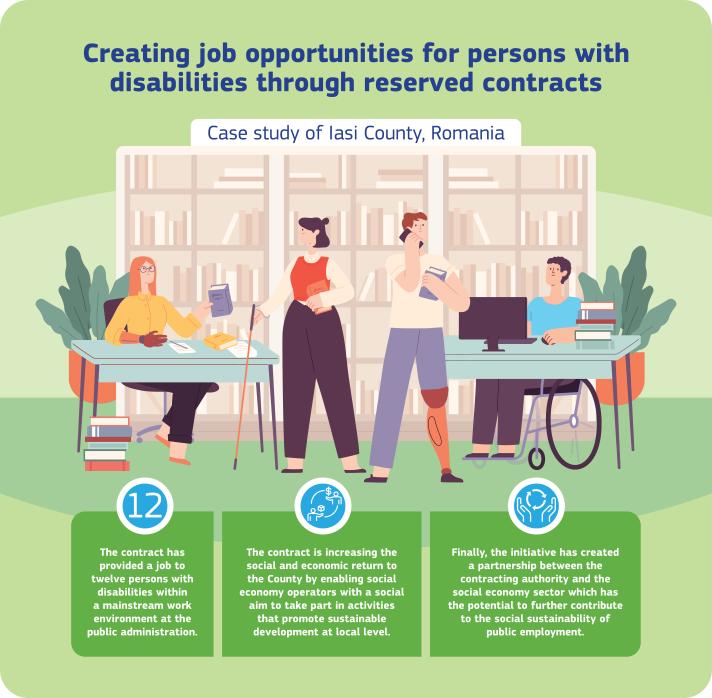Procurement category: Bookbinding and archival processing services
Social impacts targeted: Employment of disadvantaged groups
Background
According to data from June 2023, in Romania, approximately 1 out of every 20 person holds a disability certificate — totaling nearly 900,000 individuals, of which roughly 77,000 are children. Unfortunately, Romanians with disabilities are still facing challenges in enjoying their human rights, including their right to work. Indeed, Romanians with disabilities often face exclusion from employment opportunities.
To promote an inclusive labour market, Iasi County, the most populous Romanian county after the Municipality of Bucharest, identified an opportunity to launch a procurement procedure for bookbinding and archival processing services in the form of a reserved contract. The tender also included social considerations in the award criteria, aiming to favoure the employment of persons with disabilities.
In this procedure, preliminary market consultation was key to understanding the opportunities available in the market, ensuring that contract requirements were suited to the specific nature of social economy actors and their employees and, therefore, guaranteed a successful delivery of the services.
The total value of the contract, signed in 2024, was 527.878,00 RON. The contract will last 12 months.
Procurement objectives
In line with the Directive 2014/24/EU, the Romanian Law no. 98/2016 on public procurement introduced mechanisms aiming to promote social and professional integration of disadvantaged persons. Indeed, Art 56 of the Law allows contracting authorities to reserve the right to participate in public procurement procedures to sheltered workshops and to Work Integration Social Enterprise (WISE) (transposition of the Art. 20 Directive 2014/24/EU into the Romanian legislation). Law No. 448/2006 on the Protection and Promotion of the Rights of Persons with Disabilities also contains provisions aiming to allow Romanian persons with disabilities to enjoy their right to work, including through reserved contracts (Article 78, paragraph 3, letter b).
Building on the above-mentioned provisions of the Law No. 98/2016 and the Law 448/2006, the call for tenders was used as an occasion to create new job opportunities for persons with disabilities. The initiative also promoted the access to public procurement markets by sheltered vocational workshops.
The contracting authority devoted significant efforts to preliminary market consultations to ensure that the contract requirements for the requested services would be suited to the characteristics of sheltered vocational workshops and their workers. This market research allowed to better draft the tender documents and, in consequence, find a supplier meeting the contracting authority’s needs and objectives.
Tender requirements
The call for tenders was published on 28 August 2024.
Subject matter
Binding and archivistic processing services for the Iasi County Council performed at the premises of the contracting authority
Selection criteria
In accordance with the Art. 78 (Chapter V) of Romanian Law no. 448/2006 on the protection and promotion of the rights of persons with disabilities, bidders were asked to present the “authorisation to operate as a protected unit”. In line with the provisions of Romanian Law no. 219/2015 on the social economy, the bidders were also requested to present the “social enterprise certificate” and the “certificate proving the status of a social enterprise for integration”.
Award criteria
The qualitative award criteria further addressed the employment of disadvantaged groups. The weight of this criterion was a maximum of 10 points. The remaining 90 points were determined by price only.
The criterion was evaluated as follows:
The bidder undertaking to employ the largest number of personnel from disadvantaged/vulnerable groups in delivery of the services covered by this contract was receiving the maximum number of points under this criterion (10 points).
For the other bids, the score P(n) is calculated
P(n) = N(n) ÷ N(max) x 10
* P(n) score obtained by the bid under evaluation
* N(n): number of disadvantaged personnel that the bidder under evaluation commits to employing to deliver the services of the contract
* N(max): number of disadvantaged personnel that the bidder receiving 10 points committed to employing.
It must be shown that the bidder has the capacity to recruit, train, and retain such workers over a similar period to that covered by this contract.
Verification
The contracting authority is monitoring compliance with social considerations monthly. To this end, it requests written reports from the contractor each month. Reports include: the invoice, a narrative report on the accomplished tasks, and a Human Resources report on the employed persons with disabilities.
Results
The contracting authority received one bid, which responded to the requirements. The awarded social economy entity not only engaged 10 of its employees with disabilities in the implementation of the contract, but it also hired two new persons with disabilities to provide Iasi County with the required services.
The services are carried out successfully without major problems and are fully in line with the specifications and expectations of the contracting authority. Therefore, the contracting authority is satisfied with the results of the procedure.
Moreover, the tender has been recognised by ENSIE, the European Network of Social Integration Enterprises, as a good practice in the field of socially responsible public procurement. Indeed, the case study has been added to the ENSIE Responsible Public Procurement Database, which showcases leading examples from cities and encourages the adoption of responsible consumption approaches in public spending.
Social impacts
The contract has provided a job to twelve persons with disabilities within a mainstream work environment at the public administration. Out of these twelve persons, ten were already working for the successful bidder, while two have been hired to implement this contract. Therefore, the initiative has created two new jobs.
Moreover, the contract is increasing the social and economic return to the County by enabling social economy operators with a social aim to take part in activities that promote sustainable development at local level. It is also giving greater space to social purpose businesses that put people at the centre of their activities.
Finally, the initiative has created a partnership between the contracting authority and the social economy sector which has the potential to further contribute to the social sustainability of public employment.
Lessons learned
The experience of the contracting authority is positive and, for this reason, the County is envisaging, once the present contract is concluded, to launch a new reserved tender procedure to require the same services.
- Reserved contracts are a lever for the work and social inclusion of people with different forms of disadvantage and for whom access to mainstream labour markets is more difficult.
- The reserved tender procedure fosters partnerships between public authorities and civil society. The collaboration is an effective way to address societal challenges such as the unemployment of disadvantaged groups. Indeed, the exchange allows contracting authorities to better understand the needs of disadvantaged groups and better address them.
- Investing time in the pre-procurement stage ensures a good fit between the specification of the service and the solutions available in the market for reserved contracts.
- It is advisable to increase the weight of quality criteria in the award criteria (still largely determined by price) to increase the social impact of public procurement
Contact: ADV Romania Group
Tender documents are available online here.


